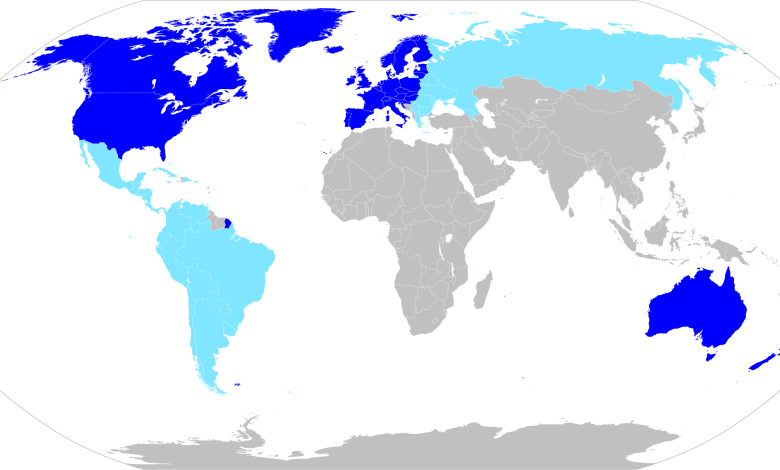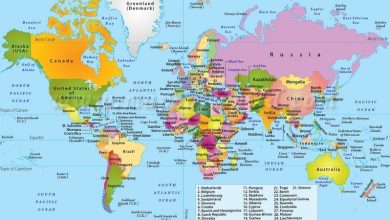What are the main reasons why Western Countries Are More Developed?

Have you ever wondered why Western countries are more developed than other countries? If this question has been puzzling you, you just came to the right place. Before you continue reading, remember that by Western Countries or Western World, we are referring to nations in Australasia, Western Europe, and Northern America with shared cultural, political, and economic aspects.
Their historical origin dates back to the Greco-Roman world and Christianity, with geographical concepts evolving over centuries from the division of the Roman Empire to the Great Schism. And the concept of their geopolitical evolution has shifted over time, influenced by colonization and exploration, encompassing nations like Australia and New Zealand, and sometimes including countries like Japan.
List of Western World Countries
| Country | Notes |
|---|---|
| Andorra | Cultural and political ties |
| Argentina | Latin American country with Western values |
| Australia | Part of Australasia, influenced by British culture |
| Austria | Central European nation |
| Belgium | Western European country |
| Bulgaria | Eastern European nation with Western influences |
| Canada | North American country |
| Chile | Latin American country with Western values |
| Croatia | Central European nation |
| Czech Republic | Central European nation |
| Denmark | Scandinavian country |
| Estonia | Baltic state with Western ties |
| Finland | Nordic country |
| France | Major Western European country |
| Germany | Central European powerhouse |
| Greece | Southern European nation |
| Hungary | Central European nation |
| Iceland | Nordic island nation |
| Ireland | Western European island nation |
| Israel | Middle Eastern country with Western alignment |
| Italy | Southern European nation |
| Japan | East Asian country with significant Western influence |
| Latvia | Baltic state |
| Liechtenstein | Small Central European principality |
| Lithuania | Baltic state |
| Luxembourg | Small Western European country |
| Monaco | City-state in Western Europe |
| Netherlands | Foundational country of Western civilization |
| New Zealand | Part of Australasia, influenced by British culture |
| Norway | Scandinavian country |
| Portugal | Southern European nation |
| Poland | Eastern European nation |
| Romania | Eastern European nation |
| San Marino | Microstate in Southern Europe |
| Singapore | Southeast Asian city-state with Western ties |
| Slovakia | Central European nation |
| Slovenia | Central European nation |
| South Korea | East Asian country with strong Western ties |
| Spain | Southern European nation |
| Sweden | Scandinavian country |
| Switzerland | Central European nation |
| United Arab Emirates | Middle Eastern country with Western influences |
| United Kingdom | Major Western power |
| United States | Major Western power |
| Uruguay | Latin American country with Western values |
| Vatican City | Independent city-state in Italy |
This list reflects a blend of countries from various regions, including Europe, North America, and parts of Oceania and Asia, that are often associated with Western values and culture. The inclusion of countries like Japan and Israel highlights the broader interpretation of the “West” beyond geographical boundaries
Why are these countries more developed?
Western countries are often regarded as more developed than other regions due to a complex interplay of historical, cultural, economic, and geographical factors. Here are the main reasons contributing to this disparity:
Historical Context
- Colonial Expansion: From the 15th to the 20th centuries, Western nations, particularly European powers, engaged in extensive colonization. This allowed them to extract resources, establish trade networks, and exert political control over vast territories, leading to significant wealth accumulation.
- Industrial Revolution: The Industrial Revolution began in Western Europe in the late 18th century, marking a pivotal shift from agrarian economies to industrialized ones. This transition facilitated technological advancements and increased productivity, positioning Western nations at the forefront of global economic development.
Cultural Factors
- Cultural Values: Western societies have historically emphasized values such as individualism, rationality, and innovation. These cultural traits fostered environments conducive to scientific inquiry and technological progress.
- Philosophical Foundations: The intellectual heritage of ancient Greece and Rome laid the groundwork for Western thought. The Renaissance and Enlightenment periods further propelled ideas about democracy, human rights, and scientific exploration, which have been integral to Western development.
Economic Structures
- Capital Accumulation: Wealth generated from colonial enterprises and the exploitation of resources contributed to capital accumulation in Western countries. This wealth was reinvested into infrastructure and industry, facilitating further economic growth.
- Urbanization: Rapid urbanization in Western nations created concentrated labour markets that spurred innovation and economic diversification. Cities became hubs of commerce and industry, attracting talent and investment.
Geographical Advantages
- Resource Availability: Many Western countries benefited from abundant natural resources such as coal and iron ore, essential for industrialization. Favourable climates also supported agricultural productivity, which sustained growing populations.
- Geopolitical Positioning: The geographical layout of Europe—with its proximity to other cultures and trade routes—fostered competition and exchange that stimulated technological advancements. The continent’s fragmented political landscape encouraged innovation through rivalry.
Technological Advancements
- Military Technology: The advancement of military technologies, including gunpowder weaponry, allowed Western nations to dominate conflicts and expand their territories effectively. This technological edge often stemmed from substantial investments in military research and development.
In summary, the development of Western countries can be attributed to a combination of historical events like colonialism and industrialization, cultural values promoting innovation, economic structures favouring capital accumulation and urbanization, geographical advantages in resource availability, and technological advancements in military capabilities. Each of these factors has contributed to creating a landscape where Western nations could thrive economically and politically on a global scale.
How did cultural values contribute to Western development?
One of the key reasons why Western Countries Are More Developed is linked to their cultural values. Cultural values have played a significant role in the development of Western societies, influencing political, economic, and social structures.
The interplay of classical traditions, Christian ethics, Enlightenment ideals, individualism, and political pluralism has been instrumental in shaping the development trajectory of Western countries. These cultural values not only provided a framework for governance and economic systems but also fostered an environment that encouraged innovation and personal responsibility, leading to sustained progress over centuries.
Here are the key ways in which these values contributed to Western development:
Influence of Classical Traditions
Philosophical Foundations: The cultural heritage of ancient Greece and Rome laid the groundwork for Western thought. Concepts such as democracy, individual rights, and rational inquiry emerged from Greek philosophy, while Roman contributions included legal frameworks and governance models. These ideas formed the basis for modern political systems and legal institutions in the West.
Christian Ethics: The integration of Christian values into Western culture emphasized the sanctity of the individual and moral responsibility. This religious framework supported notions of liberty under the law and influenced social norms regarding personal conduct and governance. The Christian Church also played a pivotal role in establishing educational institutions, which fostered intellectual growth and inquiry.
Enlightenment Ideals
Reason and Science: The Enlightenment period marked a shift towards reason, empirical evidence, and scientific inquiry as a means to understand the world. Thinkers like John Locke and Voltaire championed individual rights, democracy, and secular governance, which inspired revolutions and shaped modern democratic institutions across the West.
Economic Development: The cultural emphasis on individualism and personal responsibility fostered an environment conducive to capitalism. Max Weber’s thesis on the relationship between Protestant ethics and capitalism highlights how these cultural values encouraged hard work, thrift, and economic success, which were critical for the rise of industrial economies in Western nations.
Individualism and Innovation
Encouragement of Innovation: Western culture has historically valued innovation and creativity. This emphasis on individual achievement led to significant technological advancements during the Industrial Revolution. The ability to think independently and challenge established norms facilitated progress in various fields, including science, technology, and the arts.
Political Pluralism: The cultural commitment to pluralism and tolerance allowed diverse ideas to flourish within Western societies. This openness contributed to vibrant democratic practices where multiple viewpoints could coexist, further enhancing social stability and economic growth.





